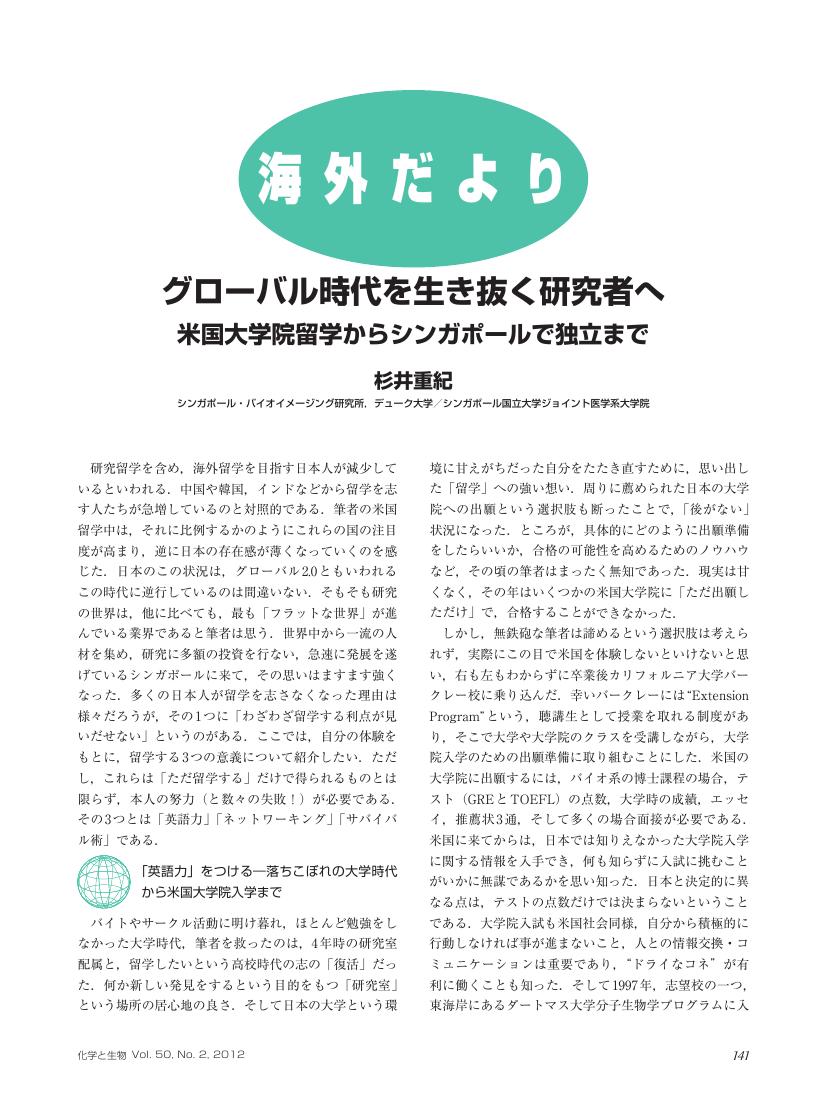- 著者
- 甲斐 千代子
- 出版者
- 甲南女子大学
- 雑誌
- 甲南女子大学研究紀要. 文学・文化編 (ISSN:1347121X)
- 巻号頁・発行日
- no.49, pp.37-46, 2012
7 0 0 0 IR 新聞紙を利用したチャンバラにおける打突速度及び時間の基礎的実験
- 著者
- 山本 博男 宮澤 祐輔 中川 真宏 中原 皓平 六田 茂行 ムクァヤ ゴディフレィ
- 出版者
- 金沢大学人間社会学域学校教育学類附属教育実践支援センター
- 雑誌
- 教育実践研究 (ISSN:18831427)
- 巻号頁・発行日
- no.34, pp.27-31, 2008
7 0 0 0 OA 新しい子育て支援制度の検討状況 : 就学前施設を中心に
- 著者
- 東弘子
- 出版者
- 国立国会図書館
- 雑誌
- 調査と情報 (ISSN:13492098)
- 巻号頁・発行日
- no.788, 2013-04-30
7 0 0 0 構造材料の立場からみたNHK大学ロボコン2010
- 著者
- 平尾 桂一 西 聖二
- 雑誌
- 軽金属 (ISSN:04515994)
- 巻号頁・発行日
- vol.61, no.8, pp.433-434, 2011-08-30
- 著者
- Nishikawa Kanto
- 出版者
- Kyoto University
- 巻号頁・発行日
- 2008-03-24
新制・論文博士
7 0 0 0 OA ジオパークに生じた諸問題―持続可能なシステムの構築に向けて―
- 出版者
- 公益社団法人 日本地理学会
- 雑誌
- E-journal GEO (ISSN:18808107)
- 巻号頁・発行日
- vol.7, no.2, pp.296-306, 2012-12-31 (Released:2013-01-31)
- 著者
- 望月 智代
- 出版者
- 神戸女学院大学
- 雑誌
- 女性学評論 (ISSN:09136630)
- 巻号頁・発行日
- vol.23, pp.113-114, 2009-03
7 0 0 0 IR アンドレ・ブルトンと野生の思考(1)『蛇使いの女マルチニック』をめぐって
- 著者
- 谷 昌親
- 出版者
- 早稲田大学法学会
- 雑誌
- 人文論集 (ISSN:04414225)
- 巻号頁・発行日
- no.49, pp.17-38, 2010
- 著者
- 高橋 恵美子
- 出版者
- 東京大学大学院教育学研究科総合教育科学専攻生涯学習基盤経営コース
- 巻号頁・発行日
- 2013-03-25
報告番号: ; 学位授与年月日: 2013-03-25 ; 学位の種別: 修士 ; 学位の種類: 修士(教育学) ; 学位記番号: ; 研究科・専攻: 教育学研究科総合教育科学専攻
7 0 0 0 IR 百人一首かるた選手の競技時の脳の情報処理に関する研究
- 著者
- 武田 昌一 長谷川 優 平井 祥之 小杉 年範 津久井 勤 山本 誠一
- 出版者
- 近畿大学生物理工学部
- 雑誌
- Memoirs of the Faculty of Biology-Oriented Science and Technology of Kinki University (ISSN:13427202)
- 巻号頁・発行日
- no.24, pp.33-43, 2009-09
Departmental Bulletin Paper
7 0 0 0 Genetic Relationships of the Genus Tridentiger (Pisces, Gobiidae) Based on Allozyme Polymorphism
- 著者
- Mukai Takahiko Sato Torao Naruse Kiyoshi Inaba Kazuo Shima Akihiro Morisawa Masaaki
- 出版者
- 社団法人日本動物学会
- 雑誌
- Zoological science (ISSN:02890003)
- 巻号頁・発行日
- vol.13, no.1, pp.175-183, 1996-02-15
- 被引用文献数
- 1
The genetic relationships and taxonomic status of 7 taxa belonging to the genus Tridentiger (Pisces, Gobiidae) were investigated by means of analysis of allozymic variation at 14 loci. The results suggest that the two taxa "T. obscurus" and "T. brevispinis" which are sympatric and morphologically similar are reproductively isolated and are highly divergent from each other (the genetic distance values are 0.501-0.707). It is also suggested that "T. brevispinis" and "T. kuroiwae" are genetically different enough from each other to deserve subspecies at least. The other 4 taxa, "T. barbatus", "T. nudicervicus", "T. trigonocephalus" and "T. bifasciatus", are genetically divergent each and are considered to be 4 biological species. A dendrogram showing the phylogenetic relationships of the 7 taxa was constructed from the genetic distances.
7 0 0 0 OA AGENT: 機能テストのためのテスト項目作成の一手法
- 著者
- 古川 善吾 野木 兼六 徳永 健司
- 雑誌
- 情報処理学会論文誌 (ISSN:18827764)
- 巻号頁・発行日
- vol.25, no.5, pp.736-744, 1984-09-15
ソフトウェアの機能テストのためのテスト項目を系統的に作成するAGENT技法を提案した.AGENT技法は 機能図式(Function Diagram)という形式的な記法によってソフトウェアの機能仕様を表現した後 機械的にテスト項目を作成する技法である.機能図式は 入力や出力の順序に依存した対応関係を表す状態遷移(状態遷移図で記述する)と 状態遷移の各状態での入力データと出力データや遷移先状態との対応関係を表す論理関係(原因結果グラフあるいは決定表で記述する)とから成っている.AGENT技法では この機能図式から 通過すべき状態の列と各状態での入出力データの条件の組合せとして 以下の条件を満たすテスト項目を機械的に作成する.?各状態での入出力データの条件を確認するのに十分である.?状態遷移を構造化した構造化状態遷移の各遷移を少なくとも1回は辿る.?構造化状態遷移の繰返しは0回と1回の2通りを実現する.このテスト項目作成を自動的に行うためにAGENTプログラムを開発した.本論文では テスト項目作成の考え方 AGENTプログラムの概要について述べた.
7 0 0 0 IR 昭和初期(1925-1937年)のラジオ番組『子供の時間』にみる音楽に関する考察
- 著者
- 葉口 英子 Hideko HAGUCHI
- 出版者
- 静岡産業大学情報学部
- 雑誌
- 静岡産業大学情報学部研究紀要
- 巻号頁・発行日
- no.10, pp.79-96, 2008
本稿は、日本放送協会発足時から始まるラジオ番組『子供の時間』にみる昭和初期(1925-1937年)の音楽をめぐるさまざまな活動に着目し、その内容と変遷を明らかにすると同時に、番組の生産、受容の場にみられる特徴を探り、ラジオという媒体を通じて、子どもと音楽がどのように関連づけられたかを考察するものである。『子供の時間』は、1925年から41年にかけて放送された教養番組であり、全国の子どもに向けて、教養・娯楽を提供するものとして始まった番組である。毎日夕方に三十分の枠で放送された『子供の時間』では、必ず歌や音楽のコーナーが設けられるなど、音楽は番組内でも大きな位置を占めた。その内容をみると、童謡・唱歌、和楽、洋楽、各楽器の独奏、うたのおけいこ、歌劇といった子ども向けの歌や音楽が数多く紹介されている。当初の番組では、音楽といえば童謡・唱歌のみで占められていたが、次第に歌劇・洋楽・和楽といった種類の音楽も加わり、バラエティに富んだ内容へと変化した。また、番組のテキストと連携した「特選童謡」のコーナーでは、一般の子どもたちが投稿する詞にプロの作曲家が曲をつけた童謡が生まれた。ラジオが一般にも広く普及しはじめ、地方放送局による自局編成が盛んな頃になると、地元の小学生や幼稚園児が童謡・唱歌の合唱団として参加するようにもなり、各都市で子ども向けの音楽に関連した団体の活躍がみられた。昭和初期の『子供の時間』が取り組んだ音楽をめぐるさまざまな実践は、子どもたちの音楽環境、音楽経験に影響を与えただけでなく、ラジオという媒体の特性を生かしながら、従来の学校教育とは異なる形で、子どもと音楽が結びつく新たな空間と場を提供したのである。
7 0 0 0 個人制作コンテンツの興隆とコンテンツ産業の進化理論
- 著者
- 樺島 榮一郎
- 出版者
- 東京大学
- 雑誌
- 情報学研究 : 学環 : 東京大学大学院情報学環紀要 (ISSN:1880697X)
- 巻号頁・発行日
- vol.77, pp.17-41, 2009-08-31
7 0 0 0 雲霞形態の成立と展開--中世和画屏風の一側面
- 著者
- 泉 万里
- 出版者
- 東京国立博物館
- 雑誌
- 東京国立博物館研究誌 (ISSN:00274003)
- 巻号頁・発行日
- no.447, pp.p15-24, 1988-06
7 0 0 0 OA Coh-Metrix とパターン認識を用いた課題英作文の自動評価
- 著者
- 小林 雄一郎 金丸 敏幸
- 雑誌
- じんもんこん2012論文集
- 巻号頁・発行日
- vol.2012, no.7, pp.259-266, 2012-11-10
本研究は,Coh-Metrix とパターン認識の技術を用いて,英語学習者による課題英作文の自動評価を試みるものである。自動評価の基準は,既存の評価システムによる分類結果とし,出力結果を比較,検討することによって,よりよい採点システムの可能性を模索する。
- 著者
- Suguru OHTA
- 出版者
- 海洋科学技術センター(JAMSTEC)
- 雑誌
- JAMSTEC深海研究
- 巻号頁・発行日
- no.17, 2001-03
7 0 0 0 OA 東京都の「世界都市」化戦略と政治改革
- 著者
- 上野 淳子
- 出版者
- 日本都市社会学会
- 雑誌
- 日本都市社会学会年報 (ISSN:13414585)
- 巻号頁・発行日
- vol.2010, no.28, pp.201-217, 2010 (Released:2011-12-20)
- 参考文献数
- 35
- 被引用文献数
- 1 2
This paper aims to examine the changing nature of the Japanese and Tokyo's political system, which have driven spatial reformation and resulted in socio-spatial polarization in Tokyo after the bubble economy burst. By analyzing the policy changes, this paper reveals three points. Firstly, the destruction of inter-area redistribution system and the new market-oriented, urban development policy demonstrate the neoliberalizaion of Japanese “developmental state.” The government has reduced “inefficient” public investment in rural area and concentrated investment in Tokyo to promote large-scale development project by private firms. Though the Japanese government has still guided development, the political system became different from a “developmental state.” Secondly, spatial reformation of Tokyo has been enabled through neoliberal reformation in other realm by Tokyo Metropolitan Government (TMG). TMG has placed top priority on spatial reformation to become a “Global City” at the expense of welfare, medical services and education. Finally, fiscal crisis and fear of losing international status have urged the Japanese government and TMG for neoliberal reform. Tokyo's deteriorating competitiveness will continue to provide a further motive for exploring neoliberal strategies.
- 著者
- 魚住 真司
- 出版者
- 同志社大学
- 雑誌
- 同志社アメリカ研究 (ISSN:04200918)
- 巻号頁・発行日
- vol.37, pp.87-100, 2001-03
論説, Article
7 0 0 0 OA グローバル時代を生き抜く研究者へ
- 著者
- 杉井 重紀
- 出版者
- 公益社団法人 日本農芸化学会
- 雑誌
- 化学と生物 (ISSN:0453073X)
- 巻号頁・発行日
- vol.50, no.2, pp.141-146, 2012-02-01 (Released:2013-02-01)
- 参考文献数
- 7




